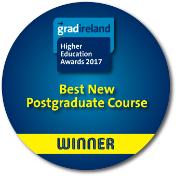NUI Galway’s Climate Change, Agriculture and Food Security masters degree program wins 2017 HEA award for best new postgraduate course in Ireland

NUI Galway's MSc program in Climate Change, Agriculture and Food Security (MScCCAFS) has been chosen by GradIreland and the Higher Education Authority (HEA) as the winner of the 2017 “Best New Postgraduate Course” award at the GradIreland HEA Awards in Dublin.
This was the most hotly-contested category at this year's HEA Awards. Yet, the MScCCAFS emerged as the winner from a shortlist of 14 new postgraduate courses at higher education institutions across Ireland and Northern Ireland.
The HEA Award judges’ praised the MScCCAFS for its relevance for "managing and conserving the planet and new ways of looking at the world holistically" and also noted that the MScCCAFS is a "leading programme on the international front".
The MScCCAFS is a highly inter-disciplinary, 1-year Masters degree program run by the NUI Galway Plant & AgriBiosciences Research Centre (PABC), in close partnership with the international CGIAR Research Programme on Climate Change, Agriculture and Food Security (CCAFS). www.ccafs.cgiar.org
The MScCCAFS program integrates scientific, engineering, technical, social and policy skills in one course. Students become much better equipped to understand and make significant contributions regarding adaptation and mitigation of climate change impacts on global agriculture and food security.
The Director of the MScCCAFS programme, Prof. Charles Spillane highlighted that “we have deliberately designed the MScCCAFS program so that our students can interact with and learn from over 50 world-leading experts on climate change and agriculture from Ireland and internationally. The MScCCAFS program is generating superbly-skilled and highly-motivated graduates that can practically contribute to developing agricultural and agrifood systems, policies and activities that can address the challenge global warming poses for agriculture and food security worldwide. Our graduates provide the skills that many public sector organisations, companies and NGOs increasingly require to effectively address the challenges posed by climate change”.
MScCCAFS students undertake a range of intensive taught modules, combined with a research project. The 2015-2016 MScCCAFS students researched topics such as climate smart agricultural practices, food losses and waste, sustainable diets, cacao value chains, rural energy access, gender and dairy intensification, climate change impacts on aquaculture, farmer knowledge of climate change, and mitigation options for reducing greenhouse gas emissions from agriculture. Many leading research partners worked with the 2015-2016 MScCCAFS students, including the United Nations Food & Agriculture Organisation (FAO) and the CGIAR. For their projects, students were located in research partners in countries such as Kenya, Tanzania, Zambia, Malawi, Peru, Colombia and Ireland. Blogs of their research projects can be found on: www.plantagbiosciences.org/mscccafs-students
The MScCCAFS Course Coordinator Dr. Peter McKeown said “We are delighted to accept this award, which is a testament to the importance of the CCAFS topic and to the development of the course over the past three years. We would like to particularly acknowledge the contribution and engagement of our many international guest lecturers and our partner organisations who host students during their research placements. These are particularly important aspects of the course, in particular the internationalisation which the judges singled out for recognition. Needless to say, we also acknowledge the excellent work of our dynamic MScCCAFS students, past and present, who are the rationale for the course and the means by which the MScCCAFS can deliver impact over time”.
The MScCCAFS has proved particularly popular with Irish Aid Fellowship recipients, with three completing the course in its first year, and four fellows currently enrolled. They have described the course as “interesting”, “innovative” and “comprehensive,” and have praised the course for demonstrating how “a combination of technical, social, engineering, scientific and policy skills can effectively tackle global challenges.”
The MScCCAFS course is currently accepting applications for enrolment in the 2017-18 academic year through the Postgraduate Application Centre (www.pac.ie).
Further details on the MScCCAFS program can be found on the NUI Galway PABC website: http://www.plantagbiosciences.org/msc-ccafs